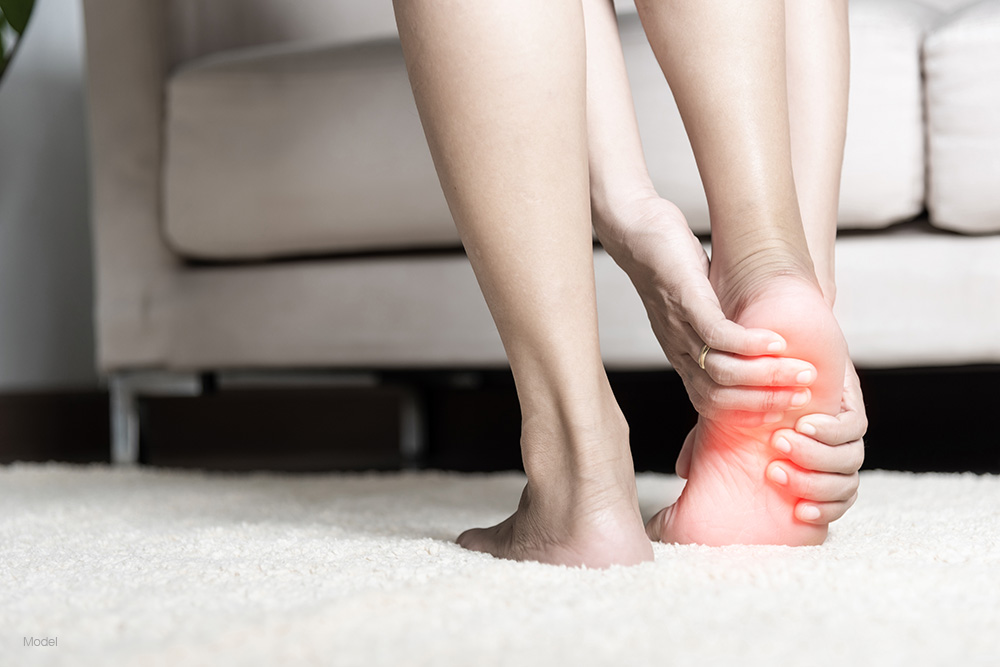Can a Neuroma Go Away?
Posted November 19, 2025 in Uncategorized

A neuroma is a painful foot condition that occurs when one of the nerves in the ball of the foot becomes inflamed. Neuromas can cause ongoing foot pain, making it challenging to participate in activities you enjoy. Unfortunately, neuromas won’t go away on their own, but many effective treatment options are available.
3 Min Read:
Table of Contents
- What Is Morton’s Neuroma?
- At-Home Treatments for Neuromas
- Non-Surgical Treatment Options for Neuromas
- Surgical Treatment for Severe Morton’s Neuromas
What Is Morton’s Neuroma?
Morton’s neuroma is an inflammation of one of the nerves of the foot that causes the nerve to enlarge and thicken. Patients often feel like they have a small rock or marble under the ball of their foot. Other symptoms of Morton’s neuroma might include:
- Pain between your toes
- Swelling on the ball of your foot
- Tingling, or a feeling of pins and needles
- A clicking sensation in the ball of the foot
The pain may be worse with activity or when wearing high-heeled shoes or shoes with a narrow toe box. You may find relief by taking off your shoes and massaging your feet. The condition will likely worsen over time if it is not treated.
What Happens if I Don’t Treat My Neuroma?
An untreated Morton’s neuroma can lead to nerve damage or severe, chronic pain. Early treatment is best, as non-surgical therapies tend to work most effectively at this stage, therefore preventing long-lasting complications.
At Chelsea Foot and Ankle, our podiatrists will perform a thorough examination to determine the reason for your discomfort. If we diagnose a neuroma, we will develop a comprehensive treatment plan that may include home care, non-surgical procedures, or surgical treatments, depending on the severity of your condition.
At-Home Treatments for Neuromas
There are some steps you can take at home to relieve neuroma pain, such as:
- Choose shoes with low heels and wide toe boxes
- Massage or ice the affected area
- Use orthotic insoles or shoe pads
- Switch to lower-impact workouts
While these steps may help relieve discomfort, they won’t make the neuroma go away without medical treatment.
Non-Surgical Treatment Options for Neuromas
At Chelsea Foot and Ankle, our doctors usually attempt conservative treatments for neuromas before recommending surgery. Some of those treatments might include:
- Corticosteroid injection
- Alcohol injections
- Anti-inflammatory medications
- Custom orthotics
There are cases when patients do not respond to the above treatments. In such cases, we can offer a specialized, minimally invasive treatment:
Radiofrequency Ablation
Dr. Shastri performs radiofrequency ablation for neuromas, which uses controlled electrical currents to target the affected nerve bundle. The RF energy is delivered through a small cannula, inserted from the top of the foot under local anesthetic. Downtime is typically 1–2 weeks.
Surgical Treatment for Severe Morton’s Neuromas
A small number of patients may require surgery to treat their neuroma. Our experts routinely perform operations for this condition, using one of two techniques. The first procedure removes the neuroma in the ball of the foot and releases the ligaments that are causing compression and pain. The second uses a small incision to release tight soft tissues and ligaments so the affected nerve is no longer compressed.
Recovery from neuroma surgery can take a few weeks to a few months. Patients will wear a surgical shoe immediately following the procedure and sometimes require a short stint of physical therapy to restore foot function. Neuroma surgeries generally have a high success rate, with most patients experiencing immediate relief of pain.
Ready to Explore Your Treatment Options for Neuromas in New York?
Ongoing foot pain impacts your ability to participate in activities you enjoy and your quality of life. To learn more about your treatment options for Morton’s neuromas in New York City, contact Chelsea Foot and Ankle today at (646) 929-4149 or complete our online contact form.
